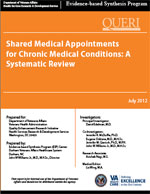
|
Principal Investigator:
David Edelman, M.D. Evidence-based Synthesis Program (ESP) Center Durham Veterans Affairs Healthcare System Durham, NC; Department of Veterans Affairs; July 2012 |
Download PDF: Complete Report, Executive Summary, Report, Appendices
The most successful health care systems offer ready access to high-quality primary care�an approach that is embedded in the fundamental design of Veterans Affairs (VA) health care and which is consistent with the Institute of Medicine's definition of high-quality care. This definition emphasizes safe, effective, patient-centered, timely, efficient, and equitable health care. Group medical visits are a method to deliver health care that offers the promise of improving these aspects for patients with chronic conditions.
Group visits (or clinics) are a system redesign in which clinicians see multiple patients together in the same clinical setting. Shared medical appointments (SMAs) are a subset of such clinics and are defined by groups of patients meeting over time for comprehensive care for a defining chronic condition or health care state. SMAs usually involve both a person trained or skilled in delivering patient education or facilitating patient interaction and a practitioner with prescribing privileges. SMA sessions typically last 60 to 120 minutes, with time set aside for social integration, interactive education, and medication management, in an effort to achieve improved disease outcomes.
SMAs have been scientifically tested in an array of primary care settings over the last 10 to 15 years. However, there has been great variability among these studies in relation to setting; components included in the intervention; and measurement of clinical, cost, and utilization outcomes. For example, the patient group may stay constant, in an attempt to provide group bonding, or the patients may be allowed to choose sessions from a schedule at their convenience to promote attendance. Like patients, provider teams can be constant or vary over time. This uncertainty regarding the optimal design and impact of SMAs led the VA to commission this evidence synthesis report.
Our objective was to summarize the effects of SMA on staff, patient, and economic outcomes and to evaluate whether the impact varied by clinical condition or specific intervention components.
We addressed the following key questions: